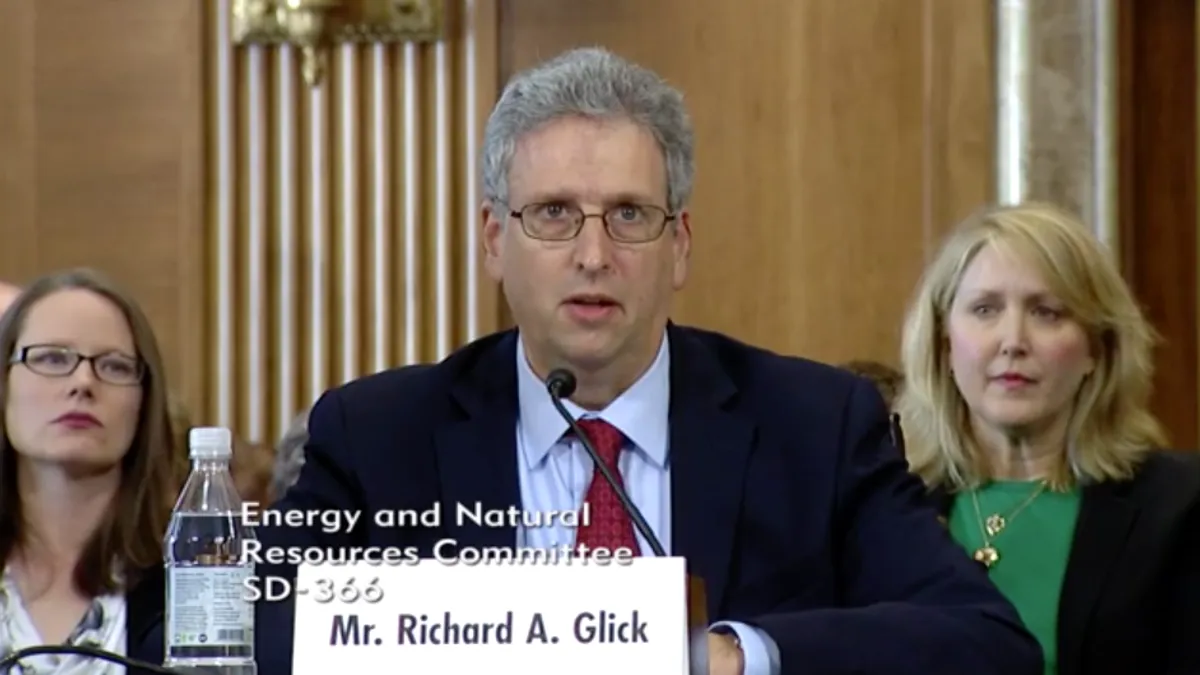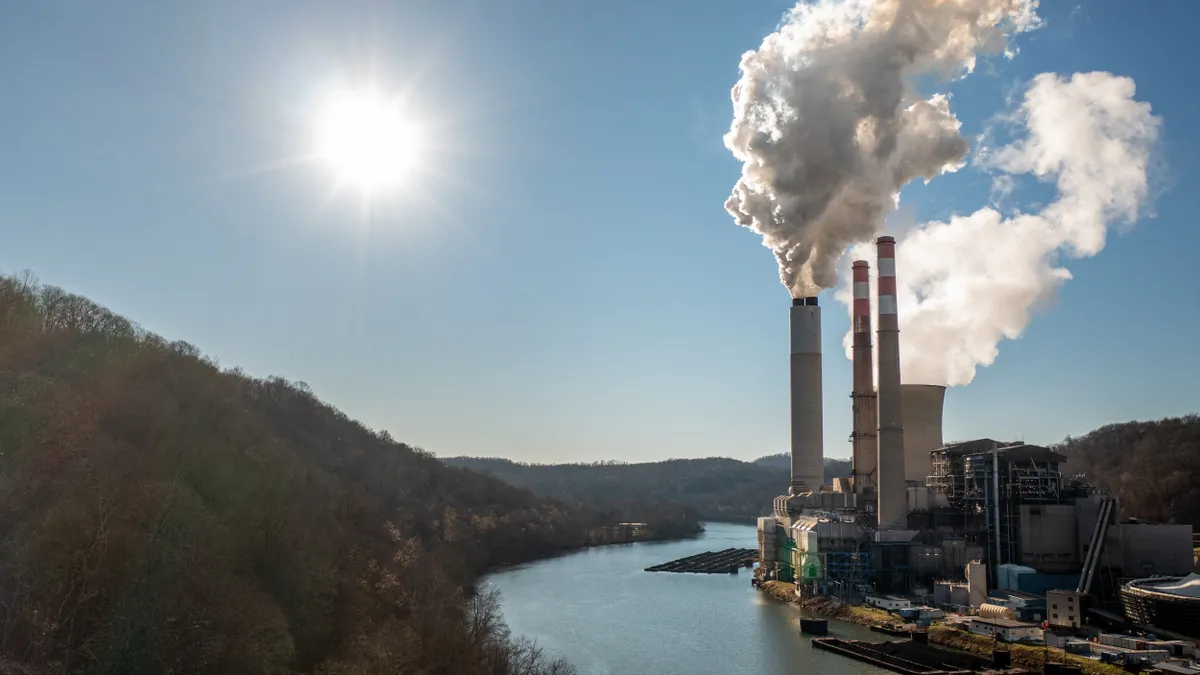Federal Energy Regulatory Commissioner Richard Glick said Wednesday he has no knowledge of efforts at his agency to assist the Trump administration in bailing out money-losing coal and nuclear plants.
"I would like to know what they're doing," Glick said, referring to the FERC staff. "I think Commissioner [Neil] Chatterjee would like to know what they're doing and so would Commissioner [Cheryl] LaFleur, so I just thought I'm kind of at a loss right now trying to figure out what they are doing."
Last week, FERC Chief of Staff Anthony Pugliese reportedly told a nuclear energy conference the commission is working with the White House, Department of Energy and the National Security Council to identify power plants that are critical to the grid. That security review is the first step in a Trump administration plan leaked in June to save coal and nuclear plants from retirement.
FERC later said that it was only providing technical assistance to ensure critical electricity infrastructure is protected, but Glick said even that role had not been communicated to him and other commissioners.
"The commission does provide technical assistance and has been doing that for a long time," he said on the sidelines of the Midcontinent ISO Market Symposium in Indianapolis. "Maybe that's what [Pugliese is] doing. I honestly just don't know."
The comments from Pugliese, a Trump political appointee hired by then-Chairman Chatterjee last year, reignited concerns from former regulators that the agency may be falling under the political influence of the Trump administration and sparked calls from liberal groups for the chief of staff to resign.
Glick, however, said regulators and staff outside the office of Chairman Kevin McIntyre, to whom Pugliese reports, did not know of any cooperation with the White House. If politicalization exists at FERC, he said, it hasn’t reached the other regulators.
"Obviously the chief of staff's comments I think brought some politics into it," Glick said. "But I do want to make a distinction between the commissioners because I don’t think any of us — Commissioner Powelson included, but the others as well — I don’t think any of the commissioners are that partisan."
Whether or not the regulators consider party politics, many high-profile votes in Glick’s first term fell on partisan lines. Since being confirmed to his seat last November, the Democrat has opposed approval of every major pipeline FERC has considered, writing in dissents that the commission does not properly evaluate their impacts on climate change.
"I don’t think that’s politics," Glick said of the pipeline orders. "I do think its badly wrong what they’re doing, but I don’t see it as a political decision. I think it’s more their views of their responsibilities under the Natural Gas Act, and maybe their views on climate change."
Glick is now in a position to influence those decisions like never before. Last week, Republican Commissioner Robert Powelson stepped down a year and a half before his term was up, allowing Democrats at the agency to deadlock votes in 2-2 ties until a replacement is confirmed by the Senate. Glick hopes the vacancy will give the remaining regulators a chance to "reset the question" on pipelines and other contentious issues facing the regulators.
"Maybe we all stuck to our guns a little and we all ran to our sides, and now we're in a situation where we can't do that any longer at least until another slot is filled," he said. "So I'm hoping to work with the chairman and Commissioner Chatterjee and certainly Commissioner LaFleur for figuring out a path forward."
Pipeline politics
FERC’s continuing controversy over pipeline permitting involves two key issues: market need and climate impacts.
Under FERC’s current pipeline policy, established in 1999, regulators determine if there is market need for a new pipeline by the transportation capacity contracts a developer signs with gas customers, like a local utility or power plant.
Critics argue this can open the door to "self-dealing" when the contracts for pipeline capacity are signed by affiliates of the same company that is building the pipeline. It’s a point Glick has brought up in numerous dissents he wrote in his first year.
Additionally, Glick and other liberal critics question how FERC weighs the climate impacts of new pipelines.
Last August, the D.C. Circuit Court ordered FERC to expand its consideration of greenhouse gas impacts in response to a challenge against the Sabal Trail pipeline in Florida. In the past, FERC had only considered the direct GHG impacts of pipeline construction, but the court ordered it to also take into account a pipeline's potential influence on the production and consumption of natural gas.
FERC's Republican majority responded by nominally accounting for expanded GHG impacts in future decisions, but arguing such measurements are too imprecise to be significant. It’s a position that seems to frustrate the Democratic commissioner.
"I've been disappointed that the other side," he said. "The three people that have been voting in the majority haven't been in, in my opinion, at all flexible on this issue, and they're probably upset at me for not being flexible as well."
Glick said that perspective may come back to haunt the Republican majority as environmental groups file court challenges against the pipeline construction certificates approved by FERC.
"I think the commission is creating greater uncertainty here by essentially creating a litigation position when there might not have been one in the first place," Glick said. "I think the D.C. Circuit in the Sabal Trail case in my view and in Commissioner LaFleur’s view is pretty clear about where we should be headed, and for whatever reason the majority has been very stubborn in my opinion ignoring the admonition of the D.C. Circuit."
"There's a lot of people out there now that have a certificate," he added, "but what happens if the D.C. Circuit and other appellate courts decide to send these cases back to the commission because [we] didn’t do it right the first time in terms of analyzing greenhouse gas emissions?"
Dissent strategy
Glick is cognizant his dissents may assist organizations filing legal challenges to commission decisions. In many cases, the statements released by his office are strongly worded, using legal terminology that directly challenges the grounding of FERC’s orders.
"Dissents I think are read by not only the reviewing courts but by others out there, and I think it gives them thoughts about how they want to address an issue going forward," Glick said. "So ... we do use terms like ‘arbitrary and capricious’ and ‘substantial evidence’ and everything else because I’d rather do that than just say I don’t agree with this opinion."
More than simply challenging a majority ruling, Glick sees a role for dissents in assisting the nonprofit organizations and citizen groups that often file suits against energy infrastructure projects.
"Quite frankly some of these appeals ... are brought by folks without a lot of resources," he said. "I think some do better than others in filing their briefs and I think in some cases the court could use extra help."
Glick said does not view this dissent strategy as a break from commissioners of the past, or think it undermines the FERC’s authority,
"I'm not suggesting that people who weren't inclined to file an appeal should," he said. "I'm just saying that I think maybe we're laying out the road path for making the arguments on a legal basis as opposed to an emotional basis."
Glick will have greater opportunity to influence the commission’s legal foundation in the coming months as FERC considers the first review of its pipeline policy since 1999, as well as high-profile dockets on grid resilience and the PJM capacity market.
"Maybe we can figure out a better approach and the [pipeline review] process I think is a perfect opportunity for us to do just that," he said. "It’s not just a GHG solution. My perspective is also on how you define market need and what you use to determine it."






















